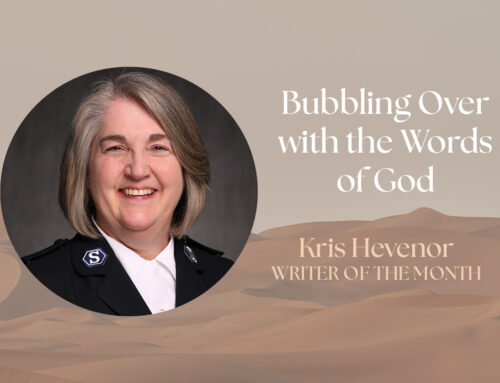Unplugging from the Busyness
by Robert Mitchell


I often hear friends say, “This has been an insanely busy week for me,” or something along those lines.
That seems to be the refrain of our rushed society. Distractions come from every direction. Our cell phones vibrate constantly. Every few minutes, another “ding” alerts us to more messages, breaking news, and information that we ostensibly can’t live without. Can all the stimuli coming at us every second really be that urgent?
Many friends tell me they will look at their calendars, see an open day, and wonder if they’ve forgotten something. They can’t imagine actually having any free time between work, school, soccer practice, music lessons, dinner preparation, and nightly television. They often schedule more events rather than slow down.
Studies show that many people get caught up in the hoopla and fail to unplug and spend time with family or friends—let alone God. How do we cultivate a deep and nourishing spiritual life when we’re constantly going full tilt? How do we stop the rollercoaster and get off the ride?
Many Christians say their spiritual growth comes from a strong devotional life—reading the Bible, praying, spending quality time with God each day, meditating on a Bible verse or passage, and listening for the “still, small voice” of God. Christians often refer to this as “quiet time” and it can take various forms, including reading, music, journaling, coloring or whatever brings a person closer to God.
Some people buy a new devotional book or Bible reading plan at the dawn of a new year, but the busyness of life quickly gets in the way. Pretty soon, they’re tempted to set aside the things of God, check their email or phone, channel surf, and settle on Netflix. Too often, God gets the leftovers. If people run out of time, God gets nothing.
When there is no Bible reading, meditating, or prayer, our relationship with God becomes distant. Like the person who doesn’t eat and becomes physically weak, we become spiritually drained without the nourishment of God’s Word. We’re surprised when spiritual stagnation, the snare of false teachers, and a fall into sin occurs.
What can be done?
In the classic Christian book The Screwtape Letters, written by C.S. Lewis, a senior demon is training his nephew and understudy on how to keep humans from the things of God. Among his advice: “You will find that anything or nothing is sufficient to attract his wandering attention. You no longer need a good book, which he really likes, to keep him from his prayers or his work or his sleep; a column of advertisements in yesterday’s paper will do. … You can make him do nothing at all for long periods.”
So, how did we get here and what can we do? How do we harken back to a simpler and less busy time?
Majors Samuel and Janet Gonzalez, who lead The Salvation Army’s Spiritual Life Development Department in the USA Eastern Territory, said busyness is valued in America’s secular culture.
“It seems like in our society, there is so much emphasis on producing, on doing, and accomplishing,” Major Samuel said. “That is one reason we get so busy. We see it as a sign of upward mobility. When we look at other cultures, leisure and free time are signs of upward mobility.”
Major Janet said today’s secular mentality tells us “We are better because we are doing more; assigning value more to the doing than to the being.”
“We became such a busy society through technology, which was supposed to improve the quality of life, but it has added another layer to our life,” she said. “Now, instead of having 10 things to do, we have 20 after receiving 10 emails. It’s not always a healthy approach to view productivity as a sign of efficiency. We become slaves of our own system.”
The Barna Group found this to be true in 2017 when it released a study showing 62 percent of parents check their phone when they wake up—not their Bibles. The survey of 1,000 U.S. parents found they check their email (74 percent), social media (48 percent), news (36 percent), and calendar (24 percent). Fewer than one in five (17 percent) used a Bible or devotional app.
Lifestyle choices
Major Samuel said the key to overcoming this trap and engaging your spiritual life is to be intentional about setting aside time for the things of God—and making it a habit.
“It becomes like the air we need to breathe daily,” his wife added. “Without it, we know something is missing.”
Major Samuel said a mature Christian knows the importance of spending time with God.
“It’s something we know, and we feel,” he said. “The Holy Spirit encourages us and admonishes us to seek time with the Lord.”
Major Janet said, “The intentionality can be as simple as putting your slippers under the bed each night. When you wake up, you must bend down to get the slippers. That provides a great opportunity to start your day in prayer.”
She said spending time with God should not be a priority, but the priority for a growing Christian.
“People say God is important to them, but is He really the No. 1 priority? When you understand that it’s His time, every hour, it shouldn’t be a burden to make time for the giver of everything that we are and have.”
Major Janet, using another clothing metaphor, said if you start buttoning a shirt with the third or fourth button, you may later discover it’s misaligned.
“If you start with the first button on top, going all the way down, they will fall in place,” she said. “Starting your day with God is like the first button. I don’t dare to leave my house without having presented myself to the Lord. I start my day with the Lord and it’s my intentional submission to Him.”
What is your priority?
Lt. Colonel Patricia LaBossiere, who formerly led the SLD Department the Gonzalezes now head up, said she often hears people say they are switching churches “because I’m not being fed.” She warned that Christians can’t depend only on Sunday morning sermons and mid–week Bible studies for spiritual growth.
“We also have to be able to feed ourselves spiritually,” she said. “I really believe the Lord wants us to take that into our own hands as well. I think that’s something that’s important for us, in busy times, to be able to figure out ways that we can do that.”
Echoing the Gonzalezes, LaBossiere said time spent with God must be a priority. Americans often plan their lives around football on Sunday and their favorite weeknight television programs, but do they make the same commitment to time with God?
“Look at what you spend your time on,” she said. “So many people, myself included, spend time on our phones, whether it’s scrolling social media or playing a game, but if our spiritual life is a priority, we’ll carve out that time.
“It’s like any other habit. If we want to build a habit into our lives—eating healthy or exercising or connecting with family and friends—we have to prioritize and discipline ourselves to find the time to do it.”
Parenting challenges
That can be a challenge for young parents like Stephanie Maragoudakis, a Christian mother from Saugerties, N.Y. She has three children, including a special–needs child and another with ADHD. Going to therapy sessions, physician appointments, and providing care for her special–needs child “often takes up my whole day.” Some days, she admits, it all “seems impossible” and devotions are “shelved.”
“I find the best time for me is first thing in the morning before the kids are awake,” she said.
Maragoudakis has also tried in the evening after her kids are in bed, “but then I often struggle to keep my eyes open.”
“Some days a devotional for me is worshipping Him through listening to music in the car, taking the kids for a walk, and using it as a time of prayer,” she said. “I use my shower time as time to surrender my heart and mind to Him. Some days, it’s just not there and on those days I’m especially thankful for His grace.”
Lisa Williams, who attends a Salvation Army church in Augusta, Maine, said being a mom “can be terribly difficult for me at times” when it comes to maintaining a devotional life.
“I find myself having to wake myself up much earlier in the morning before the kids do in order for me to have time in prayer and worship,” Williams says. “I also have to tip–toe quietly because the moment they hear I am awake, that morning coffee date I had with Jesus is over.”
Sometimes she’ll hop in her van and go for a long drive, asking Siri to play her favorite worship music so she can sing along and talk with God. During the busy Christmas season, she leaves for work early and stops by the lake near her house for some solitude. She sits in her car eating breakfast and chatting, praying, and worshipping.
“It’s not always easy to make time for Him, but when I humble myself, I look at how He made time for me and what He did during that time,” Williams said. “He gave His life on the cross for me to be saved from sin and washed clean. He is good. He is the Almighty. He is worth my time.”
It’s a balancing act
Maureen Hill, the media and community relations specialist for the Salvation Army’s Rochester, N.Y., Area Services, said six children, two jobs, pets, and family keep her busy. She and her husband take time while driving to thank God for their blessings.
“We notice the beauty of the clouds, the birds on the corner when we stop at red lights, and pray through songs while listening to K–LOVE,” she said.
The Bible tells us Jesus often got up early in the morning and went off alone to pray. Many in The Salvation Army follow that lead and are also morning people. Major Ismael Correa, a pastor in Allentown, Pa., gets to the gym as early as 4 a.m.
“No one is there at that time,” Correa says. “I go through my routine while listening to sermons or podcasts dealing with matters of faith and practice. When I can’t make it to the gym, I will go for a walk at the end of the day and listen to music. As I breathe in and out, I focus on God and acknowledge His presence in my life.”
Chrisie Villanueva, a caseworker for The Salvation Army in McKeesport, Pa., said she also finds time for God early in the morning and before she goes to bed at night.
“Honestly, at night is easier for me because I’m not in a hurry to run off to work because I’m running late,” she said. “I am a firm believer in the way you start and end your day is how you spend your day.”
While driving to work, she enjoys listening to Christian music and shutting out the noise of the world.
“We should all find some way to spend time worshiping God, saying prayers for ourselves and others, doing devotionals or just humming His hymns as we clean,” she said. “Trusting in God’s words, truth, and guidance can make a huge difference in our lives. So, even if for a moment we remember who never forgets us, that can make a huge difference in our lives.”
Lisa Miloshevsky, assistant director of The Salvation Army’s Eliza Shirley House in Philadelphia, said “seeking God’s face first thing in the morning is precious to me.” She participates in a daily devotional call with several women starting at 7 a.m.
“His teachings carry me throughout the day and His abundant love gives me the ability to ‘pour out’ on others,” Miloshevsky says. “These devotions remind me that my relationship with Him is most important and being in His word provides the wisdom and knowledge I need to stay ‘looking up.’”
Help for officers
Miloshevsky said God also speaks to her through music. She is continually singing praise music, which can often be heard coming from her office. She is also occasionally led to pick up her guitar and invite others in for a small worship session.
“There is nothing like a group of worshippers raising their voice to Him,” she said. “This world is fast–paced and chaotic, and we need Him now more than ever. He is our first love, so we must make time for Him; I must make time for Him. The Lord will not yell. He speaks softly, so we must make the time to ‘be still’ so that we can hear Him.”
Kimberly Felder, the receptionist at the Ray and Joan Kroc Community Center in Philadelphia, is another early riser. She’s up at 6 a.m. for quiet time and says, “My day would be empty without starting each day with prayer.” Felder then heads for work, where she takes part in a daily devotional with the women’s fellowship each morning.
Grace Eisenhart, the office and social services manager at The Salvation Army in Sunbury, Pa., also makes time to be in God’s Word each morning.
“When I’m going throughout my day, I just try and thank God for the many things He has done for me,” she said. “I talk to Him while I am walking or driving.”
Yolanda Ransom, a resident assistant at the Salvation Army’s Genesis House in Rochester, N.Y., said she sets a clock and dives into her devotions when the timer goes off.
“Open the Bible (a real one or the app) and see what God is saying for the day,” she says.
Lieutenant Dontay Gibson, a Salvation Army pastor in Plainfield, N.J., reads a passage of scripture each morning and leaves a note about something he took away. He also likes to review past readings and notes, see how he has grown as a Christian, and maybe update the note.
“This has allowed me to find God in the details and find significance in what we may deem insignificant or ‘repetitive and redundant.’ Every time I’ve gone through, I always found a new perspective or principle within the scriptures,” he said.
Gibson is not the only Salvation Army officer who sees the benefit in starting his day with God. Captain Nora McNeil, a pastor in Manchester, N.H., said she begins and ends her day with Bible reading and devotions and “given the nature of our work, He is not very far away at any point in time.” Captain Aida Rolon, a Salvation Army pastor in Geneva, N.Y., agreed, saying, “As an officer, if we don’t do that, it gets harder during the course of the day.”
Being like Jesus
Captain Larry Fulmer, a Salvation Army pastor in Altoona, Pa., said Jesus often retreated to “desolate places” to pray and he likes to do the same.
“One thing that I do personally is to make sure I take my sabbath and to find rest in ‘being.’ This may look like going for a walk, retreating to my own ‘desolate place’ where I can find peace and rest, or doing something that I enjoy,” Fulmer says. “This is something that I need to prioritize in my own life, otherwise I will let life get in the way.”
Captain Esther Wilson, who pastors a Salvation Army church in Athol, Mass., agreed with many of her colleagues who say that people find time for what is important to them.
“We can’t ‘find’ time. We have to ‘make’ time,” she says. “It’s intentional. It’s discipline. I have found as I mature in my Christianity that if I try to find the time, it isn’t there. But if I intentionally carve out the time in a day and make it a habit, then the time is there.”




